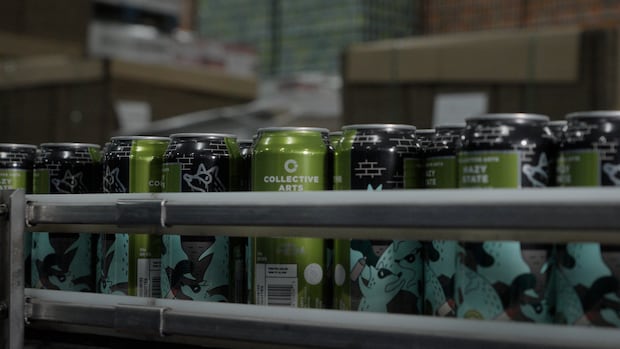Since leaving the Navy, Michael McCluskey, 61, was recognized for consuming closely. He had a mean of 4 to 5 drinks an evening.ht. Even having as much as 10 drinks “wasn’t aregular occasion,” he says.
However all this chan4 years in the past, when he began taking Ozempic to drop some pounds. Together with 110 kilos, McCluskey misplaced his urge for food for alcohol — rapidly and sureto bend. Today, he drinks twice a yr – when he organizes science fiction conventions.
“It’s like a swap flipped in my head,” mentioned Dartmouth, NS, man. “There isn’t a want. That is all.”
Your story shouldn’t be distinctive. Research combing via earlier affected person knowledge have made an identical hyperlink between glucagon-like peptide 1 receptor agonist medicines (GLP-1 ARs), resembling Ozempic, and lack of urge for food for extra than simply meals. GLP-1 RAs have beenpt linked to individuals who want and eat much less of all kinds of vices, be they alcohol, nicotine, marihuana or opioids. A study taking a look at social media posts steered that individuals decreased about habits resembling caffeine use and compulsive procuring too.

Scientists shouldn’t have a transparent clarification for why medicine like Ozempic seem to lower the need for addictions, together with addictive substances. However they’ve some concepts they’re testing — some right here in Canada, the place any breakthrough would assist considerably because the nation faces a rising opioid disaster.
Rising Analysis
There haven’t been many randomized managed trials – that are thought of the gold customary for evaluating medical claims – on whether or not GLP-1 ARs scale back addictive behaviors.
There’s solely a been two of those trials that studied its influence on alcohol dependence, neither of them opioid dependence and two for nicotine dependence, in accordance with a recent review revealed within the Journal of the Endocrine Society.
Christian Hendershot, a Canadian researcher primarily based in California, co-auThored one in every of these randomized clinical trialslately revealed in JAMA Psychiatrsure, taking a look at alcohol consumption.
From playing and alcohol to pornography, the medicine Ozempic and GLP-1 might quickly be used to remedy all kinds of addictions. Watch The Ozempic Impact: Past the Waistline on CBC Gem.
Within the examine, he divided 48 heavy drinkers into two teams. One obtained a weekly dose of semaglutide, the energetic ingredient in medicines resembling Ozempic and Wegovy, whereas the opposite obtained a placebo. He then tracked the quantity of alcohol the 2 teams consumed, each at house and within the laboratory.
“The semaglutide group consumed considerably much less alcohol,” mentioned Hendershot, who beforehand held a Canadian analysis chair in alcohol use problems and is now a professor on the College of Southern California.
The invention is very spectacular, says Hendershot, as a result of the topics weren’t meattempting to cut back alcohol consumption.
“The following step is to conduct scientific trials that may set up that these medicines are protected and efficient in scientific populations,” he mentioned.
Nonetheless, Hendershot recommends warning till there are bigger, long-term research.
A blunted dopamine surge
Some scientists are learning the mind’s reward system to strive perceive the mechanism at play, which can clarify why medicine like Ozempic can scale back craving or want.
A elementary a part of this method is dopamine, a neurotransmitter that’s launched once you do one thing pleasurable, like consuming a bit of cake or ending a satisfying exercise. THEat launch is basically saying, “That is nice!”
It additionally encourages you to do it once more, providing you with motivation to repeat the motion. And whereas the dopamine hit you’re feeling after train might not be the identical as what you’re feeling after consuming chocolate, there are some similarities within the reward circuits, Dr. Rodrigo Mansur, psychiatrist and researcher at Toronto Western Hospital of the College Well being Community.
“There are, in fact, important variations in how [different rewards] are regulated. However they share these underlying neural circuits,” Mansur mentioned.

Medication like Ozempic can have an effect on these neural circuits, he mentioned.
GLP-1 ARs seem to dampen the reward mechanism, the surge of dopamine that comes with reward, say researchers like Mansur. This might change the best way individuals expertise want, pleasure and motivation.
Mansur Simply Accomplished a Part 2 Randomized Scientific Trial wanting like GLP-1 ARs have an effect on motivation amongst 72 individuals combating melancholy. He’s looking for out how far sufferers taking the drug are keen to work for cash award by measuring how a lot vitality they burn when taking a cognitive take a look at. He meantensures vitality spent with a metabolic cart, which analyzes the physique because it inhales oxygen and exhales carbon dioxide.
The mind is probably the most metabolically demanding organn all through the physique, which implies it consumes about 25% of the physique’s vitality. That is why Mansur believes his examine can quantify individuals’s motivation and whether or not GLP-1 modifications it.
He’s stupendousgoing off medicines to see how they have an effect on sufferers with melancholy, who already are inclined to endure from low vitality and motivation. However he additionally desires to know extra about how GLP-1 RAs have an effect on motivation and pleasure, which he hopes could possibly be helpful for individuals with temper problems – and which might have extra implications for treating different diseases, resembling habit.
“We have to higher perceive what causes these motivation issues in individuals with melancholy, and we’d like higher therapies for it.”
Potential for habit therapy
Dependancy researchers in Canada additionally say they’re excited in regards to the potential of GLP-1 RAs of their apply.ice. Substance use is a rising and complicated downside throughout the nation: about 15 percent of individuals surveyed by Statistics Canada have been at reasonable to excessive danger of alcohol use dysfunction in 2023; for hashish, it was 13%. Since 2016, there have been almost 54,000 opioid overdose deaths.
Because of this, researchers say they’re hungry for extra proof.
The working speculation – that GLP-1 ARs can attenuate the dopamine spike that follows the consumption of an addictive drug – is thrilling, as a result of it addresses the “underlyingneural forex for all addictive behaviors,” says James MacKillop, president of the Peter Boris Middle for Dependancy Analysis at McMaster College.

“The prevailing medicines we’ve got are typically medication-specific: opioid medicines for opioid use dysfunction, nicotine medicines for tobacco use dysfunction.”
BPL-1 ARs, then again, seem to focus on the central pathway widespread to all psychoactive medicine, he says. However MacKillop warns that we’re nonetheless within the early days of the investigation.
‘The hype is outweighing the proof’
If GLP-1 ARs are efficient in treating habit, researchers should additionally work out who they’re efficient for — and that is not but clear, says Dr. Sanjeev Sockalingam, physician-in-chief on the Middle for Dependancy and Psychological Well being (CAMH) in Toronto.
The middle has proposed a number of trials that have a look at the ARs of GLP-1 to deal with nicotine and alcohol use, he says.
Discarding ifThe truth that medicines can have negative effects for these combating their psychological well being can also be key – and Sockalingam says that whereas there may be some preliminary proof that reveals there aren’t any important psychological well being negative effects, he desires to see long-term research.
Questions come up surrounding the usage of semaglutide, generally offered underneath the model identify Ozempic, for weight reduction. CBC’s Christine Birak explores the dangers and advantages of off-label use of the drug, which is historically used to deal with kind 2 diabetes.
“We simply want to ensure there aren’t any unintentional scamssequences of utilizing them extra extensively in all situations,” says Sockalingam, who’s cautiously optimistic in regards to the potential of medication in treating habit.
MacKillop agrees – he thinks that whereas GLP-1 RAs are a game-changer in some ways, there are only a few “free lunches” on the subject of drugs. Thenme on their facet The results are already well-known, resembling nausea, vomiting and constipation.
“Virtually all medicines have some drawbacks and it takes a while to actually pay attention to what they’re,” he mentioned. He fears that the thrill is not going to replicatethe complete abstractactuality.
“In some ways, these medicine are nonetheless unproven,” he mentioned. “The hype is outweighing the proof.”
THEThe reality is, he says, a drug can not deal with habit by itself. Constructing a wholesome way of life the place individuals can discover pleasure inDifferent issues like train, hobbies and buddies are important to treating habit, he says.
And, he worries, if GLP-1 ARs are an anti-craving drug, they may scale backce individuals’s motivation to keep up these features of their lives.
“They are often anti-pleasure or anti-desire medicine. And that is not essentially a very good factor when it comes to selling a wholesome restoration.”



Leave a Reply